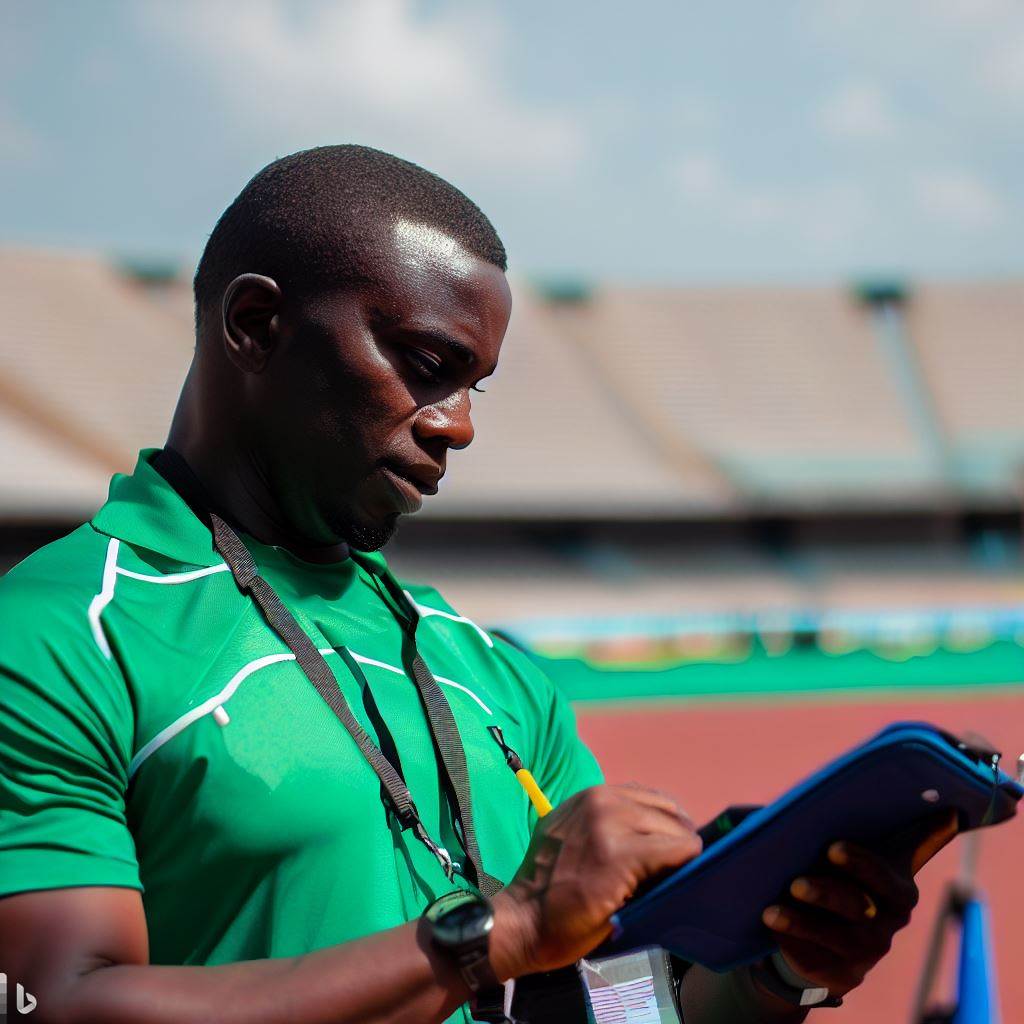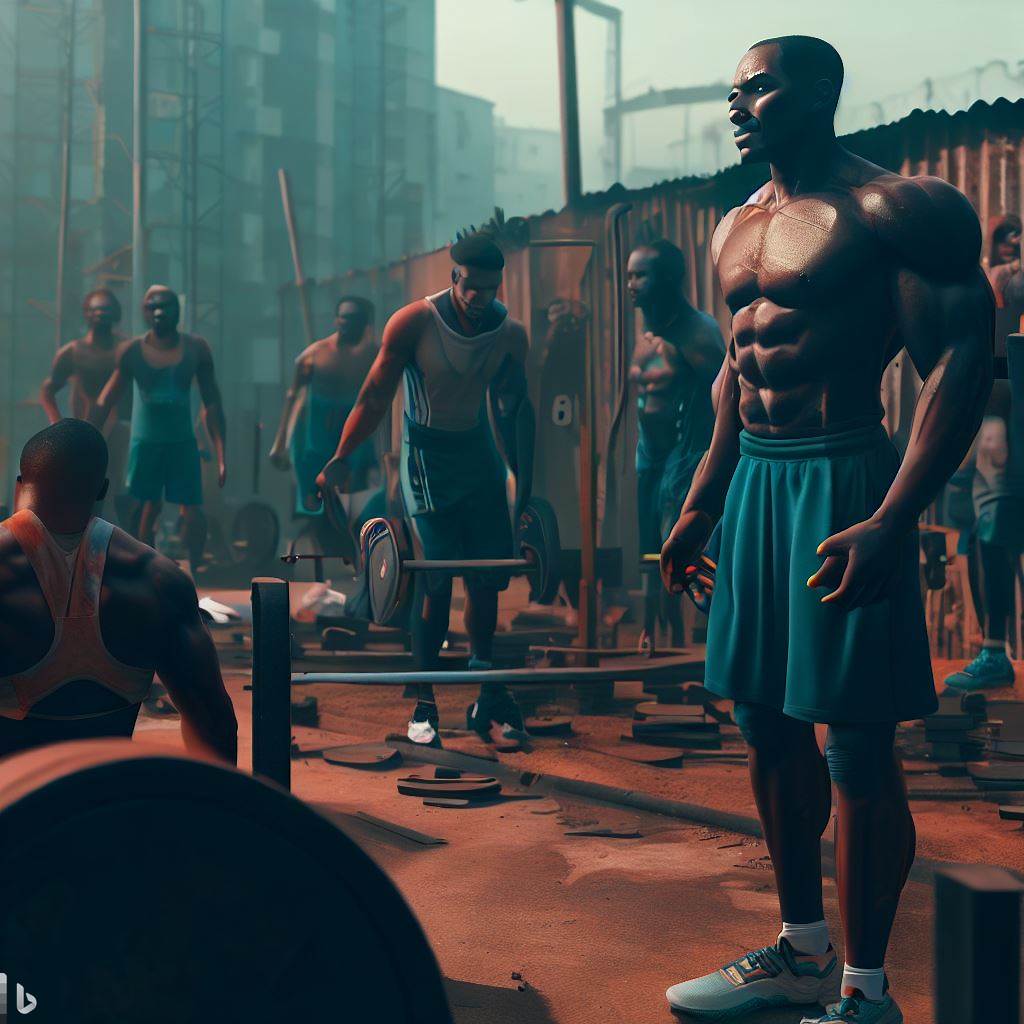Introduction
In the dynamic landscape of sports and fitness training, strength coaches in Nigeria face a multitude of intriguing challenges.
These dedicated professionals play a pivotal role in enhancing the physical prowess of athletes and fitness enthusiasts across the country.
However, their journey is far from straightforward. They grapple with unique obstacles that stem from Nigeria’s distinctive sports culture, socio-economic factors, and evolving fitness trends.
This section delves into these challenges, shedding light on the demanding terrain these coaches navigate daily.
Strength coaching in Nigeria is pivotal for sports development, but it encounters several formidable challenges:
- Limited Resources: Strength coaches often lack access to modern equipment and facilities, hindering athlete progress.
- Financial Constraints: Budgetary constraints restrict investments in coaching staff, limiting expertise development.
- Education and Training: Many coaches lack formal education and certifications, impacting coaching quality.
- Athlete Awareness: Athletes and sports organizations sometimes underestimate the importance of strength training.
- Infrastructure Issues: Poorly maintained facilities and inadequate infrastructure hinder effective strength training programs.
- Sports Culture: A focus on traditional sports over strength and conditioning can hinder progress.
- Data and Analytics: The absence of data-driven approaches limits tailored coaching and performance evaluation.
- Professional Development: Opportunities for strength coaches to enhance their skills are limited.
Strength coaching is vital in fostering athletic excellence, and addressing these challenges is essential for Nigeria’s sports development.
Lack of proper infrastructure
The inadequate facilities for strength coaching in Nigeria
One of the major challenges facing strength coaches in Nigeria is the lack of proper infrastructure.
Inadequate facilities for strength coaching greatly hinder the progress and development of athletes in the country.
The impact of limited access to equipment and training spaces cannot be underestimated.
Many strength coaches struggle to find the necessary tools and resources to effectively train their athletes.
This leads to a lack of variety in training methods and limits the potential for growth and improvement.
Investment in infrastructure development is crucial for the advancement of strength coaching in Nigeria.
This includes the establishment of well-equipped training facilities and the provision of modern equipment that meets international standards.
Impact of limited access to equipment and training spaces
Without proper infrastructure, strength coaches face numerous challenges that impede their ability to effectively train athletes.
These challenges include:
- Lack of quality training spaces: Many strength coaches in Nigeria are forced to train their athletes in subpar facilities or outdoor spaces that are not conducive to proper strength training.
This limits the effectiveness of their coaching and can increase the risk of injury. - Inadequate equipment: The scarcity of high-quality strength training equipment is a major challenge for coaches in Nigeria.
Many are forced to make do with outdated or poorly maintained equipment, which limits the variety and effectiveness of training programs. - Minimal financial support: Strength coaching is often seen as a low-priority area in Nigeria, resulting in minimal financial support from government agencies and sporting bodies.
This makes it difficult for coaches to invest in the necessary infrastructure and equipment to provide quality training. - Lack of research and innovation: Limited access to infrastructure and resources hinders the ability of strength coaches to conduct research and innovate in their training methods.
Without the necessary support and facilities, coaches struggle to stay at the forefront of advancements in strength training.
Need for investment in infrastructure development
In order to address these challenges, it is crucial for the Nigerian government and sporting bodies to recognize the importance of strength coaching and invest in infrastructure development.
This includes:
- Establishing well-equipped training facilities: The government should allocate funds to build state-of-the-art training facilities that provide coaches with the resources they need to effectively train athletes.
- Providing financial support: Sporting bodies should provide financial support to strength coaches, enabling them to purchase modern equipment and maintain their training spaces.
- Promoting research and innovation: Encouraging and supporting strength coaches in conducting research and adopting innovative training methods can greatly enhance the development of athletes in Nigeria.
- Collaborating with international partners: Building partnerships with international organizations and coaches can help bridge the gap in infrastructure and provide Nigerian strength coaches with access to cutting-edge knowledge and resources.
By addressing the challenges of infrastructure, Nigeria can unlock the full potential of its strength coaches and pave the way for the development of world-class athletes.
Challenges Facing Strength Coaches in Nigeria
Strength coaches in Nigeria face numerous challenges due to limited funding and resources.
These challenges severely impact their ability to effectively train athletes and develop their skill sets.
In this blog section, we will explore the specific challenges faced by strength coaches in Nigeria and the urgent need for increased funding and resource allocation.
Read: The Impact of Assistant Coaches in Nigerian Football
Limited financial support
Challenges faced by strength coaches due to insufficient financial support
- Insufficient funds hinder strength coaches from implementing comprehensive training programs.
- The lack of financial support makes it difficult to acquire necessary equipment and technology.
- Without adequate funding, strength coaches struggle to provide athletes with the resources they need for optimal performance.
- This lack of financial support also limits the opportunities for professional development and continuing education.
Read: Physical Fitness Standards in Nigerian Education System
Lack of access to proper training materials and resources
- The scarcity of training materials, such as books, videos, and research papers, hinders knowledge acquisition.
- Design standardized training programs to cover various aspects of strength coaching, including exercise physiology, biomechanics, and injury prevention.
- Put in place continuing education requirements to ensure coaches stay up-to-date with the latest research and developments in the field.
- Coaching associations and organizations should collaborate with educational institutions to offer accredited training programs.
Establish standardized certifications and training programs to improve the quality and professionalism of strength coaching in Nigeria.
Clients and athletes will have confidence in the expertise and competency of their coaches.
The development of a recognized qualification will enhance the reputation of strength coaching as a legitimate profession.
Standardized certifications will also attract more individuals to pursue a career in strength coaching.
The absence of standardized certifications and training programs is a significant challenge for strength coaches in Nigeria.
However, by addressing this issue and establishing appropriate processes and programs, the quality and professionalism of strength coaching can be elevated.
It is essential for relevant stakeholders to collaborate and take action to ensure standardized certifications are implemented.
This will not only benefit coaches but also clients and athletes by providing them with qualified and competent strength coaches.
Challenges Facing Strength Coaches in Nigeria
In Nigeria, strength coaches face numerous challenges, particularly when it comes to recognition and support from sports associations.
These obstacles have a detrimental impact on the development of the field and the professional growth of strength coaches.
In this blog section, we’ll delve into how strength coaches struggle to gain recognition within sports associations.
We’ll also discuss the lack of support and opportunities for career growth, emphasizing the need for increased collaboration and support from sports associations.
Read: Working Conditions of Athletic Trainers in Nigeria: A Survey

Limited recognition and support from sports associations
- Strength coaches in Nigeria often struggle to gain recognition within sports associations.
- Many sports associations fail to appreciate the importance and impact of strength training.
- The lack of recognition leads to a lack of resources and funding for strength programs.
- Without recognition, strength coaches struggle to gain credibility and respect in the field.
- As a result, their influence on athletes’ performance is often undermined and undervalued.
Lack of support and opportunities for career growth
- Strength coaches face limited career growth opportunities in Nigeria.
- The absence of structured career paths and progression hinders their professional development.
- Lack of support and mentorship from experienced strength coaches further stagnates their growth.
- The scarcity of professional development programs and workshops limits their skill enhancement.
- Without proper support, strength coaches struggle to stay motivated and advance in their careers.
Need for increased collaboration and support from sports associations
- Sports associations must recognize the vital role of strength coaches in athletes’ success.
- Increased collaboration between strength coaches and sports associations can lead to better outcomes.
- Associations should provide financial support for strength programs and equipment acquisition.
- Organize regular workshops, seminars, and conferences to enhance coaches’ skills.
- Mentorship programs connecting new and experienced coaches can fuel professional growth.
- Enact supportive policies and regulations that acknowledge and prioritize strength training.
Strength coaches in Nigeria face significant challenges due to limited recognition and support from sports associations.
To overcome these obstacles, it is critical for sports associations to value the role of strength coaches, provide support for career growth, and foster collaboration within the field.
By doing so, Nigeria can cultivate a stronger and more effective strength coaching community that will positively impact athletes and their performances.
Read: International Opportunities for Athletic Trainers from Nigeria
Cultural and Societal Challenges
Cultural Perception of Strength Coaching and its Impact on the Profession
- The cultural perception of strength coaching in Nigeria is often undervalued and overlooked.
- Strength coaches are seen as less important compared to sports coaches.
- This perception affects the recognition, funding, and support strength coaches receive.
- Strength coaching is often considered a job for the less educated or unsuccessful athletes.
- As a result, aspiring strength coaches face societal and familial pressure to pursue other careers.
- This perception restricts the growth and development of strength coaching profession in Nigeria.
Potential Stereotypes and Misconceptions about Strength Coaches
- Stereotype: Strength coaches are only concerned with physical appearance and bodybuilding.
- Misconception: Strength coaching is solely focused on weightlifting and powerlifting.
- Stereotype: Strength coaches are not qualified professionals and lack necessary certifications.
- Misconception: Strength coaching doesn’t require scientific knowledge or understanding of sports science.
- Stereotype: Strength coaches only work with elite athletes and professional sports teams.
- Misconception: Strength coaching is not relevant for youth, recreational athletes, or general population.
Strategies for Overcoming Cultural and Societal Challenges
- Educational programs and workshops to raise awareness about the importance of strength coaching.
- Promoting success stories of strength coaches in both professional and grassroots sports.
- Engaging with local communities and youth to showcase the benefits of strength training.
- Collaborating with sports federations and organizations to integrate strength coaching in their programs.
- Creating mentoring programs and scholarships to encourage aspiring strength coaches.
- Investing in research and scientific studies that validate the effectiveness of strength coaching.
To overcome the challenges facing strength coaches in Nigeria, it is essential to change the cultural perception and debunk stereotypes associated with the profession.
By highlighting the importance of strength coaching, engaging with communities, and promoting success stories, we can create a supportive environment for aspiring strength coaches to flourish.
Conclusion
Strength coaches in Nigeria face numerous challenges in their profession. These challenges include a lack of resources, inadequate funding, limited facilities, and a lack of recognition and support.
Additionally, there is a need for professional development opportunities and a standardized curriculum for strength coaches.
It is crucial to address these challenges for the development of sports in Nigeria.
Strength coaches play a vital role in the success of athletes by improving their physical abilities and preventing injuries.
Addressing the challenges they face can enhance the overall performance of Nigerian athletes, leading to greater success in national and international sports competitions.
To achieve this, it is essential for stakeholders, including government agencies, sports federations, and sponsors, to take action and provide support to strength coaches.
Allocating sufficient funding to develop infrastructure, such as training facilities and equipment, can do this.
Additionally, professional associations and educational institutions should collaborate to establish a recognized certification program and standardized curriculum for strength coaches.
Moreover, stakeholders should create opportunities for continuous professional development, such as workshops and conferences, to enhance the knowledge and skills of strength coaches.
By investing in the development of strength coaches, Nigeria can nurture a pool of well-trained professionals who can effectively contribute to sports development and athlete success.
Recognizing, addressing, and supporting the challenges faced by strength coaches in Nigeria is essential to ensure the growth and competitiveness of Nigerian sports.
By doing so, Nigeria can unlock the full potential of its athletes and achieve greater success on the global stage.




